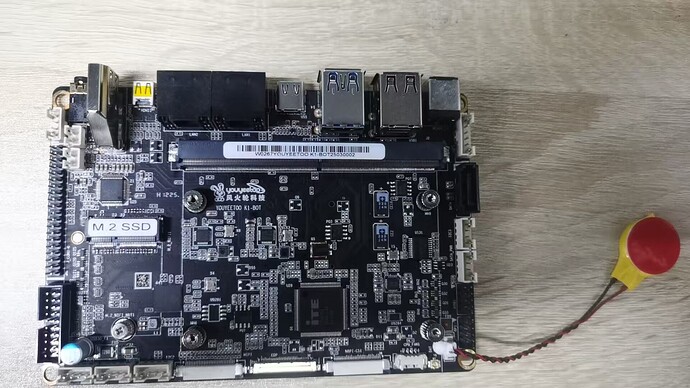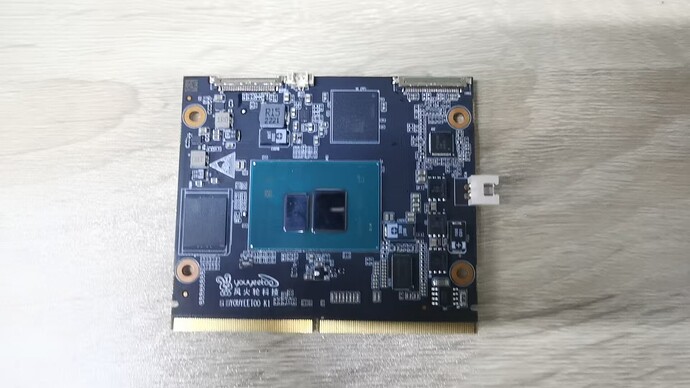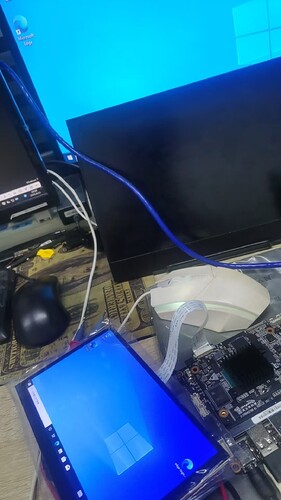Youyeetoo K1 Mini Motherboard: The Ultimate Compact x86 Powerhouse for Edge Computing
——82×71mm Core Board + Full-Featured Carrier Board, Redefining Mini PC Possibilities
Key Features
![]() Pocket-Sized Powerhouse:
Pocket-Sized Powerhouse:
- Intel 12th Gen N100 Processor (4C/4T, up to 3.4GHz) in an ultra-compact 82×71mm core board, delivering x86 performance for Windows/Linux in industrial, AI, and embedded applications.
![]() Modular Flexibility:
Modular Flexibility:
- Standalone core board with 12V DC, MIPI display, USB-C, and RTC—or pair with a palm-sized carrier board for expanded I/O: Dual Gigabit Ethernet, 2xUSB3.0,3xUSB2.0, Dual HDMI, M.2 SSD, SATA 3.0, and more.
![]() Multi-Display Ready:
Multi-Display Ready:
- Pre-tested compatibility with 7" MIPI touchscreen + 11.3" eDP display, plus HDMI multi-monitor support for digital signage/kiosk solutions.
![]() Industrial-Grade Expansion:
Industrial-Grade Expansion:
- MIPI CSI/DSI, eDP, GPIO, I2C, SPI, UART x4—ideal for robotics, vision systems, and IoT edge nodes.
![]() Developer-Friendly:
Developer-Friendly:
- Open-source Wiki tutorials, pre-configured drivers, and step-by-step guides to accelerate deployment.
Why Choose Youyeetoo K1?
- Performance Meets Size: x86 power in a mini footprint, outperforming ARM alternatives.
- Scalable Design: Use the core board alone or expand with the carrier board for maximum flexibility.
- Plug-and-Play Ecosystem: Pre-optimized displays and docs save 30% development time.
Applications
▸ Industrial HMI & Automation ▸ Edge AI Vision Processing
▸ Thin Clients & Network Appliances ▸ Portable Linux Workstations
▸ Digital Signage & Interactive Kiosks ▸ Robotics Control Hub
Join the Youyeetoo Developer Community—Unlock the Potential of Mini x86 Computing!
SPECIFICATIONS
| Category | Specifications |
|---|---|
| Processor CPU | 12th Gen Intel® Alder Lake-N N100 (Base Frequency 0.8GHz, Turbo Boost up to 3.40 GHz, 4 Cores 4 Threads (Intel 7 10nm), TDP 6W) |
| GPU | Intel® UHD Graphics (Max Frequency 750MHz) |
| RAM | Onboard 4G/8G/16G LPDDR5 (Optional) |
| Storage | Onboard eMMC: 0/64G/128G/256G |
| M.2 Expansion: Supports NVMe 2280 SSD (PCIe 3.0) & M.2 SATA 2280 SSD (Supports PCIe Gen3.0 x2 NVME) | |
| SATA Expansion: Supports SATA 3.0 SSD | |
| Networking | Wired: RJ45 Gigabit Ethernet Port x2 |
| Wireless: Expandable via M.2 E-key slot, Optional WIFI5+BT5.0/WIFI6+BT5.2 dual-band | |
| 4G LTE: Expandable via M.2 slot, default EC20 4G module (requires separate 4G adapter board) | |
| Multi-Display | HDMI Port: HDMI2.0 4K/60Hz |
| Micro HDMI Port: HDMI2.0 4K/60Hz | |
| MIPI0/MIPI1/eDP: MIPI supports FengHuolun MIPI7 LCD (1024x600 touchscreen), eDP supports FengHuolun 11.6" screen (3 options,choose 1) | |
| USB | USB-A: |
| USB3.0 x2 | |
| USB2.0 x2 | |
| USB Headers: | |
| USB2.0 x2 | |
| USB3.0 x2 | |
| USB Type-C: | USB Type-C x1 |
| Audio Output | SPK x1 (8Ω2W with amplifier) |
| HDMI-OUT x1 | |
| Mini HDMI-OUT x1 | |
| Audio Input | Analog MIC x1 |
| Headset MIC x1 | |
| LINE IN x1 | |
| M.2 Expansion | 2280: Supports NVME SSD/M.2 SATA SSD (M-KEY) |
| 2230: Supports WIFI5+BT5.0/WIFI6+BT5.2 or 4G LTE expansion via FengHuolun adapter | |
| UART | 4x UART TTL serial ports (convertible to RS232/RS485 modules) |
| I2C | 3x I2C interfaces (4-pin header), with Windows/Linux examples (3.3V default) |
| I2S | I2S x1 (6-pin) |
| SPI | SPI x1 (6-pin header), with Windows/Linux examples (3.3V default) |
| GPIO | 27x GPIO (9-pin header), with Windows/Linux examples (3.3V default) |
| LEDs | Onboard red/blue LEDs x2 (4-pin header), programmable control (APIs provided) |
| Default: Red blinking/Green off | |
| Buttons | Power Button x1 |
| Reset Button x1 | |
| RTC | SH1.25 battery holder (CR2032 compatible) |
| 3.3V RTC with ~35mAh annual consumption | |
| Power-On | Supports auto power-on (configurable in BIOS) |
| Power Supply | 12V DC Jack (5.5x2.5mm) & 2-pin XH-2A 2.54mm header |
| Dimensions | Core Board: 82mm x 71mm |
| Base Board: 134mm x 92mm | |
| OS Support | Windows 10/11 & Linux Ubuntu/Debian (with hardware operation tutorials) |
| NFC | Passive NFC communication (supports data transfer with Android/iOS devices) |
| Examples & API tutorials provided | |
| Software Watchdog | Supported via standard Windows APIs |
| CPU Temp Monitoring | Supported via standard Windows APIs |
| Fan Control | Supported via standard Windows APIs |


